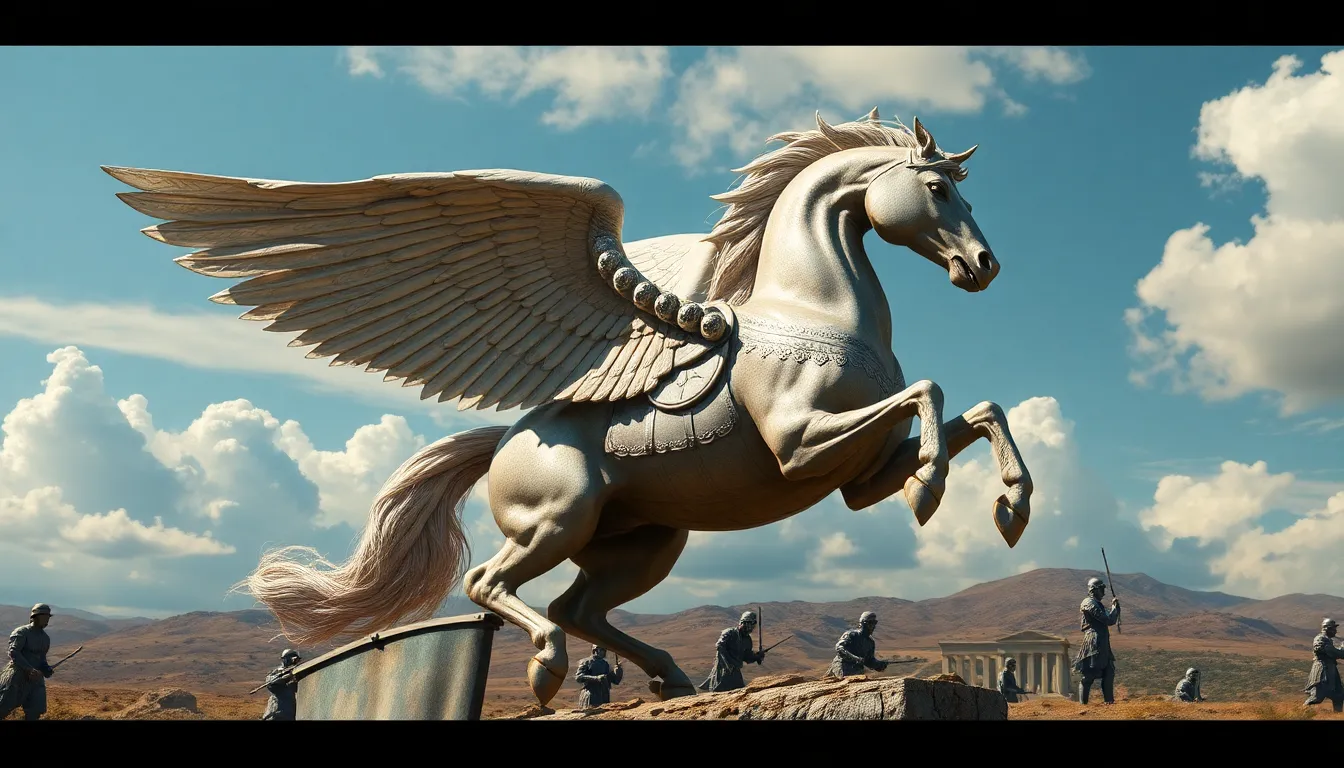The Significance of Pegasus in Ancient Greek Warfare
I. Introduction
The figure of Pegasus, the divine winged horse of Greek mythology, holds a prominent place in the cultural and military history of ancient Greece. As an emblem of inspiration and heroism, Pegasus embodies the aspirations of the Greeks and their understanding of the cosmos. The rich tapestry of Greek mythology provides essential insights into the values, beliefs, and practices of ancient Greek society, especially in terms of warfare.
Mythology served as a means for the Greeks to explain natural phenomena, human experiences, and the complexities of life. The tales of gods, heroes, and mythical creatures like Pegasus not only entertained but also educated the populace about virtues such as courage, honor, and the pursuit of glory in battle.
II. The Mythological Origins of Pegasus
A. Birth and symbolism of Pegasus
According to myth, Pegasus was born from the blood of the Gorgon Medusa when she was slain by the hero Perseus. This act of creation from a monstrous figure symbolizes the dual nature of Pegasus, representing both beauty and terror. Pegasus is often associated with inspiration and the arts, particularly poetry, as well as the ability to transcend earthly limits.
B. Connections to Greek gods and heroes (e.g., Bellerophon)
Pegasus is intricately linked to the hero Bellerophon, who tamed him with the help of a golden bridle given by Athena. Together, they undertook heroic quests, including the defeat of the Chimera, a monstrous creature that threatened the land. Bellerophon and Pegasus symbolize the ideal partnership between human ingenuity and divine assistance, showcasing the importance of both in achieving victory in warfare.
III. Pegasus as a Symbol of Victory and Triumph
A. Representations in art and literature
Throughout ancient Greek art and literature, Pegasus is depicted as a symbol of triumph and victory. Pottery, sculptures, and mosaics frequently feature images of Pegasus, often in the company of victorious heroes or gods, reinforcing his status as a celestial being associated with success. Notable representations include:
- Vase paintings illustrating Bellerophon riding Pegasus into battle.
- Statues commemorating military victories adorned with Pegasus motifs.
B. Role in inspiring soldiers and warriors
The imagery of Pegasus served to inspire Greek soldiers and warriors, fostering a sense of courage and the belief that they could achieve great feats. The association of Pegasus with divine favor suggested that those who fought valiantly would be rewarded with glory and honor, much like the heroes of myth.
IV. Pegasus in Warfare Strategy and Tactics
A. Mythological narratives influencing military strategy
Mythological narratives that included Pegasus often influenced military strategies and tactics. The Greeks believed that invoking the imagery of Pegasus would bring favor from the gods, thus motivating soldiers to fight harder and smarter. The tales of Bellerophon and Pegasus provided tactical lessons, such as the importance of agility in combat and the advantage of striking swiftly.
B. Symbolic use of Pegasus in battle formations and morale
In battle formations, the image of Pegasus was used to symbolize swiftness and the element of surprise. Commanders would utilize the concept of Pegasus to encourage their troops to be as nimble and fearless as the winged horse. This psychological boost could be pivotal in high-stakes situations, where morale often determined the outcome of battles.
V. The Cultural Impact of Pegasus on Military Honors
A. Commemoration of victories through Pegasus imagery
Pegasus imagery was widely used to commemorate military victories. After significant battles, victors would often erect monuments featuring Pegasus to symbolize their triumphs. This practice reinforced the connection between divine favor, heroism, and military success.
B. Use of Pegasus in military insignias and standards
Throughout various city-states, the image of Pegasus appeared on military insignias and standards. These depictions served as rallying points for troops, symbolizing strength and victory. They were not only practical in identifying units but also infused with symbolic meaning that inspired unity and determination among soldiers.
VI. Archaeological Evidence of Pegasus in Warfare Contexts
A. Artifacts depicting Pegasus in military settings
Numerous archaeological discoveries have revealed artifacts depicting Pegasus in military contexts. Examples include:
- Terracotta figurines of Pegasus found in warrior graves.
- Inscribed shields bearing the likeness of Pegasus, used by soldiers in combat.
B. Sites and relics associated with Pegasus and warfare
Significant sites, such as the Sanctuary of Athena in Corinth, have yielded relics that illustrate the connection between Pegasus and warfare. Mosaics and reliefs found in these areas often depict scenes of battle where Pegasus plays a central role, highlighting the cultural significance of the creature in the context of military endeavors.
VII. Comparative Analysis with Other Mythological Figures
A. Contrasting Pegasus with other symbolic creatures in warfare (e.g., griffins, sphinxes)
While other mythological creatures like griffins and sphinxes also held symbolic meanings in warfare, Pegasus stands out due to his direct association with heroism and victory in battle. Griffins often represented strength and protection, while sphinxes were enigmatic figures embodying riddles and challenges. In contrast, Pegasus is intrinsically linked to the idea of transcending limitations and achieving success.
B. The unique role of Pegasus in Greek military ideology
Pegasus’s unique role in Greek military ideology is encapsulated in the themes of aspiration and divine assistance. Unlike other creatures, Pegasus’s narrative emphasizes the relationship between mortals and the divine, showcasing the belief that human achievement is often accompanied by heavenly support.
VIII. Conclusion
A. Summary of the significance of Pegasus in ancient Greek warfare
In summary, Pegasus serves as a potent symbol of victory, divine favor, and heroic endeavor in ancient Greek warfare. His mythological origins, artistic representations, and connections to military strategy illustrate the multifaceted role he played in Greek society.
B. Lasting legacy of Pegasus in modern interpretations of Greek military history
The legacy of Pegasus endures beyond antiquity, influencing modern interpretations of Greek military history. As a symbol of aspiration and triumph, Pegasus continues to inspire and captivate the imagination, reminding us of the enduring power of mythology in shaping cultural narratives and identities.




